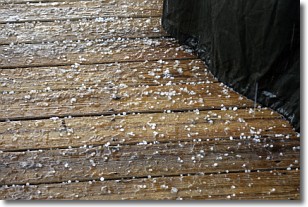Weather Alert in South Carolina
Flash Flood Warning issued August 11 at 1:43PM EDT until August 11 at 4:45PM EDT by NWS Wilmington NC
AREAS AFFECTED: Darlington, SC; Dillon, SC; Florence, SC; Marion, SC; Marlboro, SC
DESCRIPTION: FFWILM The National Weather Service in Wilmington has issued a * Flash Flood Warning for... Southeastern Darlington County in northeastern South Carolina... Southwestern Dillon County in northeastern South Carolina... Florence County in northeastern South Carolina... Northwestern Marion County in northeastern South Carolina... Southern Marlboro County in northeastern South Carolina... * Until 445 PM EDT. * At 143 PM EDT, Doppler radar indicated thunderstorms producing heavy rain across the warned area. Flash flooding is ongoing or expected to begin shortly. HAZARD...Flash flooding caused by thunderstorms. SOURCE...Radar. IMPACT...Flash flooding of small creeks and streams, urban areas, highways, streets and underpasses as well as other poor drainage and low-lying areas. * Some locations that will experience flash flooding include... Florence, Lake City, Darlington, Timmonsville, Pamplico, Quinby, Sellers, Evergreen, Effingham, Claussen, Francis Marion University, Mars Bluff, New Hope, Friendfield, Florence Darlington Technical College Main Campus, Hyman, Blue Brick, Mechanicsville, Darlington Raceway and Oak Grove.
INSTRUCTION: Dangerous flooding from heavy rainfall can be expected, especially near poor drainage areas and other flood prone locations. It is harder to recognize flood dangers at night, as it will be difficult to determine the depth of the water. Roads may be damaged or washed away. Most flood deaths occur in vehicles. If flooding is observed, then turn around, don't drown.
Want more detail? Get the Complete 7 Day and Night Detailed Forecast!
Current U.S. National Radar--Current
The Current National Weather Radar is shown below with a UTC Time (subtract 5 hours from UTC to get Eastern Time).

National Weather Forecast--Current
The Current National Weather Forecast and National Weather Map are shown below.

National Weather Forecast for Tomorrow
Tomorrow National Weather Forecast and Tomorrow National Weather Map are show below.

North America Water Vapor (Moisture)
This map shows recent moisture content over North America. Bright and colored areas show high moisture (ie, clouds); brown indicates very little moisture present; black indicates no moisture.

Weather Topic: What is Rain?
Home - Education - Precipitation - Rain
 Next Topic: Shelf Clouds
Next Topic: Shelf Clouds
Precipitation in the form of water droplets is called rain.
Rain generally has a tendency to fall with less intensity over a greater period
of time, and when rainfall is more severe it is usually less sustained.
Rain is the most common form of precipitation and happens with greater frequency
depending on the season and regional influences. Cities have been shown to have
an observable effect on rainfall, due to an effect called the urban heat island.
Compared to upwind, monthly rainfall between twenty and forty miles downwind of
cities is 30% greater.
Next Topic: Shelf Clouds
Weather Topic: What is Sleet?
Home - Education - Precipitation - Sleet
 Next Topic: Snow
Next Topic: Snow
Sleet is a form of precipitation in which small ice pellets are the primary
components. These ice pellets are smaller and more translucent than hailstones,
and harder than graupel. Sleet is caused by specific atmospheric conditions and
therefore typically doesn't last for extended periods of time.
The condition which leads to sleet formation requires a warmer body of air to be
wedged in between two sub-freezing bodies of air. When snow falls through a warmer
layer of air it melts, and as it falls through the next sub-freezing body of air
it freezes again, forming ice pellets known as sleet. In some cases, water
droplets don't have time to freeze before reaching the surface and the result is
freezing rain.
Next Topic: Snow
Current conditions powered by WeatherAPI.com




